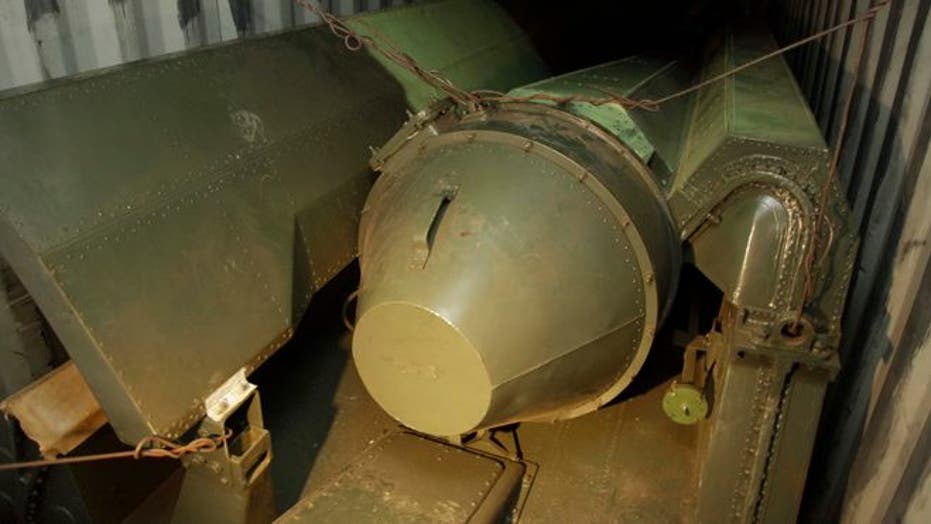Between the Cold War-era missiles hidden under bags of sugar and the North Korean transport ship with a shady, drug-trafficking past, the current weapons smuggling mess that broke Tuesday in Panama seems more like the plotline of a 1960s John le Carré novel than a news story from 2013.
Panama’s discovery of the missiles on the North Korean-flagged Chong Chon Gang, however, is real and has drawn real world criticism and comments from both foreign governments and analysts alike. The Cuban government’s acknowledgment of the “obsolete” weapons also throws into question U.S.-Cuban relations at a particularly important time between the Cold War adversaries.
U.S. and Cuban officials met Wednesday in Washington for the first time since 2011 to discuss migration, which before the incident in Panama was labeled as a good chance of improving relations.
“This might put a little of a slowdown with regards to the talks on immigration and resuming mail service to the island,” Peter Hakim, the president emeritus of the Washington D.C.-based think tank The Inter-American Dialogue, told Fox News Latino. “This is one of the dangers that every U.S. president faces when dealing with Cuba.”
Cuba has historically run afoul with the U.S. at times when these discussions were on the table. Most recently U.S. President Barack Obama reestablished the right for Cuban Americans to travel to the island, only to break them off shortly after the detention of American contractor Alan Gross on the island.
While Cuba may still play the hardline Communist nation battling U.S.-style capitalism, the talks – and the infusion of cash that comes with travel and renewed mail service – could help give a much needed financial injection into the country’s ailing economy. Cuba’s sugar output is not bringing in the cash flow that it once did and the country relies heavily on the subsidized oil shipments it receives from ideological-friendly Venezuela – some of which it is believed to sell to other nations.
“Cuba is desperate right now for foreign exchange,” Hakim said. “It’s possible that Cuba has been unloading Venezuelan oil to North Korea.”
North Korea and Cuba have had steady diplomatic ties for decades, but these relations picked up steam in 2001 when a Cuban delegation visited the North Korean capital, Pyongyang. Cuba is also one of the few countries globally to maintain close ties to the government of Kim Jong-un and is one of the four countries –along with China, Iran and Syria– to reject the weapons embargo that the UN Security Council ordered against the Asian nation in 2006.
Cuba might have much to lose over soured relations with the U.S., but North Korea doesn’t appear concerned if it angers the U.S. or not. From a number of controversial missile tests to closing the border for time with U.S. ally South Korea, Pyongyang has traditionally drawn both the ire of the United States and much of the international community.
Some experts worry that the latest incident involving Cuba’s dated weaponry is a sign of the North Korean cozying up to the U.S.’s traditional backyard neighbors.
“The very fact of the relationship between Cuba and North Korea argues for a better look at what’s going on in Havana,” said Susan Kaufman Purcell, the director if the University of Miami’s Center for Hemispheric Policy. “It means that North Korea has projected itself into the Western Hemisphere and is only 90 miles from the U.S.”
The reaction from Washington has been mixed, with the State Department holding back any formal condemnation until more information is released by Panamanian authorities while anti-Castro lawmakers have denounced the incident as another reason that Cuba is a dangerous nation.
“The fact that missile equipment was caught being shipped from Cuba to North Korea reaffirms the dangerous threats faced by our nation due to the nefarious activities by these two rogue regimes,” said Florida Republican Congresswoman Ileana Ros-Lehtinen in a press release. “This incident should serve as a wake-up call to the administration, which over the past few months has been leading an apparent effort to normalize relations with Cuba, that it cannot continue to engage the Castro regime.”
In the daily press briefing Tuesday, State Department press director Patrick Ventrell gave no hint of U.S. involvement in stopping the ship. Ventrell only said that North Korea violated a number of United Nations resolutions against arm shipments and commended Panama for stopping the ship, which in the past has been detained at least once on suspicion of trafficking drugs and ammunition.
On Wednesday, North Korea's Foreign Ministry released a statement saying Panama should release the crew detained in the apprehension of the freighter. "The Panamanian investigation authorities rashly attacked and detained the captain and crewmen of the ship on the plea of 'drug investigation' and searched its cargo but did not discover any drug," it read.
Panama – a country nominally created by the United States – has been a close ally of Washington for decades and a key player in the U.S.’s military and drug enforcement measure throughout the Caribbean and Central America. The U.S. controlled the Panama Canal until 1999, when it was handed over to the Panamanian government, but the U.S. military still has a major presence in the country.
While the State Department has been coy about its involvement in the ship’s seizure and analysts can only speculate as to what extent the U.S. was involved, there is unanimous agreement that Washington is now heavily involved in the case.
“If they weren’t there for the creation of this operation, they were there hours after the birth,” Hakim said.








































